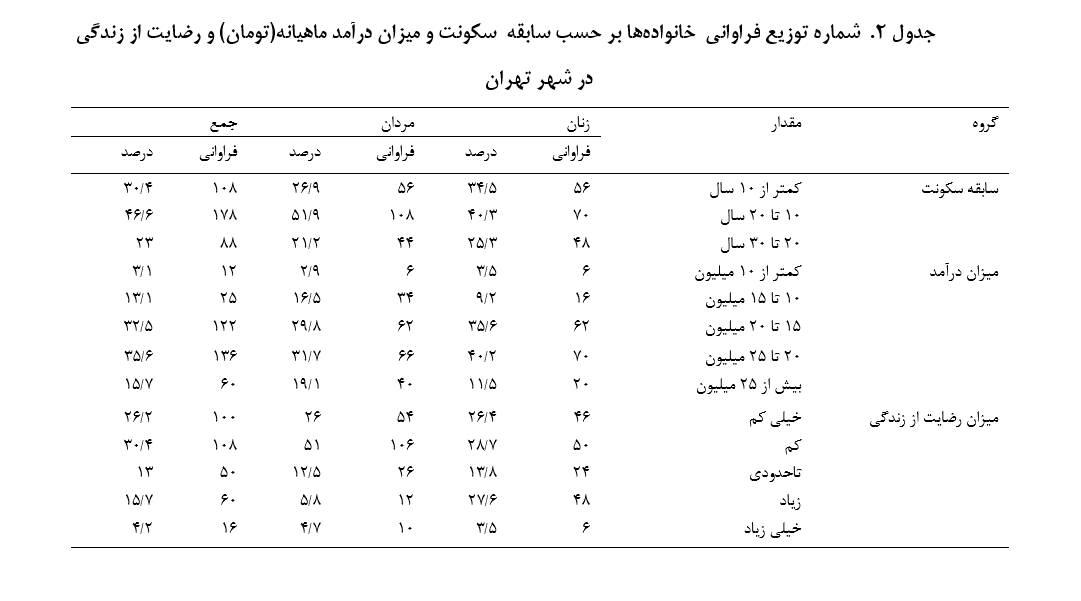A Sociological Study of the Relationship Between Development, Social Inequality, and Poverty With an Emphasis on Access to Healthcare Services (Case Study: Tehran)
Keywords:
Social inequality, poverty, health care services, Tehran cityAbstract
Poverty has been a persistent issue across various countries for many years. Despite economic growth in underdeveloped or developing countries, poverty continues to prevail. One of the critical social factors directly and indirectly influenced by the trajectory of economic development includes the state of education, healthcare, employment, poverty, and income of individuals in a society. Considering the significance of development levels in different areas of Tehran in recent years and identifying which indicators of social inequality and poverty are more closely related to the issue of development in these areas, this research was conducted with the objective of determining the relationship between the degree of development in Tehran's regions and citizens' access to healthcare services. This study employed both quantitative and qualitative approaches. The qualitative part used inductive analysis and semi-structured interviews with experts through the Delphi method. The quantitative part involved a statistical population of various Tehran residents, selected through simple random sampling. Data were collected using documentary and field methods (questionnaires) and were subsequently analyzed. The results indicate that from a sociological perspective, there is a relationship between development, social inequality, and poverty in Tehran. Regions with higher levels of development provide better access to healthcare services.
Downloads
References
Wright SSAGA. Prevalence of Depression Among Children, Adolescents, and Adults With Hidradenitis Suppurativa.
Journal of Dermatology. 2021;84(1):41-5.
Krstić M, Mihić RJ, Webber HS. The Theoretical Basis for Addressing Poverty Through Mixed Income Development.
Urban Affairs Review. 2015;42(3):369-409. doi: 10.1177/1078087406294043.
Hedda H, Ebata C. Explaining Social Exclusion: A Theoretical Model Tested in the Netherlands. The Hague: The
Netherlands Institute for Social Research/scp; 2010.
Dixon TEM. Sustainable Urban Development to 2050: Complex Transitions in the Built Environment of Cities.
Oxford: Oxford Institute for Sustainable Development, Oxford Brookes University; 2023.
Mashhadi Zadeh A. Theories of Migration and Poverty. Tabriz: Sotoudeh Publications; 2014.
Hume T, Barry J. Environmental Education and Education for Sustainable Development. International Encyclopedia
of the Social & Behavioral Sciences. 2022;2:733-9.
Irandoost K. Informal Settlements and the Myth of Marginalization. Tehran: Urban Processing and Planning
Publications; 2017.
Akrami H. Spatial Measurement and Analysis of Urban Poverty Extent (Case Study: Varamin City). Tehran: Faculty
of Geography, University of Tehran; 2021.
Khademi Zadeh A. Sociology of Youth. Tehran: Shahed University Press; 2022.
Ashrafi S, Behboudi D, Vaezzadeh Mahdavi MR, Panahi H. The Triangle of Growth, Inequality, and Poverty in Iran
During Development Programs. Social Welfare. 2018;18(71). doi: 10.29252/refahj.18.71.1.

Downloads
Published
Submitted
Revised
Accepted
Issue
Section
License
Copyright (c) 2024 Journal of Study and Innovation in Education and Development

This work is licensed under a Creative Commons Attribution-NonCommercial 4.0 International License.










